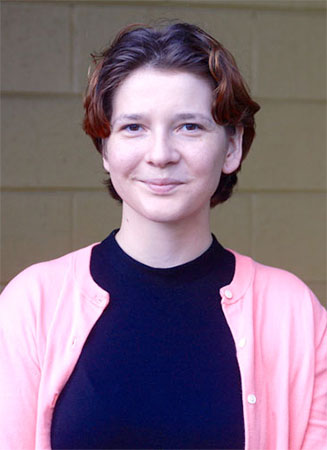Written by: Tiffany Westry
Need more info? Contact us
 Sarah AdkinsSarah Adkins and Ajanet Rountree have been selected for the 2017 National Science Foundation Graduate Research Fellowship Program. The students were chosen from a pool of more than 13,000 applicants.
Sarah AdkinsSarah Adkins and Ajanet Rountree have been selected for the 2017 National Science Foundation Graduate Research Fellowship Program. The students were chosen from a pool of more than 13,000 applicants.
The NSF Graduate Research Fellowship is a highly competitive grant given to outstanding graduate students in science, technology, engineering, and mathematics. The fellowship program provides a three-year annual stipend of $34,000 along with a $12,000 cost of education allowance for tuition and fees. The fellows are also given opportunities for international research and professional development, and the freedom to conduct their own research at any accredited U.S. institution of graduate education they choose.
Sarah Adkins is a Ph.D. student in the College of Arts and Sciences Department of Biology.
Her research with Jeffery Morris, Ph.D., seeks to explain how bacteria operate in their communities as they use common goods produced by other bacteria. Adkins is also working to create a new education theme to enhance the Department of Biology’s curriculum and connect with the way students learn best.
“I aim to create a curriculum that explores fundamental science concepts in an engaging way,” Adkins said. “The curriculums will allow students in our department to connect to and develop personal inquiries within their coursework while teaching science by national standards.”
Adkins holds a Bachelor of Science degree in biology and a Bachelor of Arts degree with a concentration in art studio from UAB. She is an alumnus of the UAB Honors College University Honors Program. Her doctoral dissertation is a continuance of her work as a master’s student, which explores the benefit art has in science education by introducing Petri dish art to UAB’s microbiology lab curriculum.
Students begin by designing their own mandala, which are circular and symbolic symmetrical artworks. Then, they use different colored bacteria they have isolated from the soil to paint their mandala design on a Petri dish. Adkins says this interdisciplinary approach to learning provides a visual and exploratory guide for students to better understand microbial ecology and molecular evolution.
 Ajanet RountreeAjanet Rountree is pursuing a master’s degree in UAB’s newly launched Anthropology of Peace and Human Rights program. Rountree earned a Liberal Arts Interdisciplinary Bachelor of Arts degree focused on women’s studies, social change, and globalization in 2016. Her research is directed at the function and importance of the female experience in nonviolent discourse as it relates to the creation and maintenance of positive peace.
Ajanet RountreeAjanet Rountree is pursuing a master’s degree in UAB’s newly launched Anthropology of Peace and Human Rights program. Rountree earned a Liberal Arts Interdisciplinary Bachelor of Arts degree focused on women’s studies, social change, and globalization in 2016. Her research is directed at the function and importance of the female experience in nonviolent discourse as it relates to the creation and maintenance of positive peace.
“Women have been regarded as recipients of, not initiators of, social change,” Rountree said. “Cognizant that this may be a gendered prejudice, the intent of my anthropological research is to investigate and evaluate the role of women in the civil rights movement, concentrating on Birmingham during the 1960s, and contrasting it to the role of women in the Liberian Mass Action for Peace movement from 1999 to 2003.”
Rountree hopes to fill the gap that exists within the peace and human rights, and global leadership narrative regarding the importance of women in peace and justice movements. She will gather firsthand accounts from female participants of the Birmingham civil rights movement and the Liberian Mass Action for Peace movement in Monrovia, Liberia. She believes that, with a shift in discourse, laws and infrastructure, perpetuate human rights violations will become a thing of the past.
Rountree is a graduate assistant for the UAB Institute for Human Rights and serves as coordinator of the institute's blog.